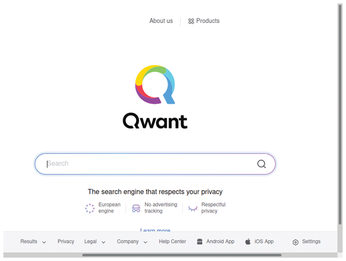Safer Internet Searches
Alternative Engines
If you are interested in data privacy, you might want to try an alternative search engine. We discuss a few search engines that serve up good results, along with an option for setting up your own search engine.
A majority of users rely on Google to find information on the Internet. Although convenient, Google can expose your personal information. Your searches result in companies tracking your online activities and then bombarding you with targeted advertising.
The privacy concerns alone might make you want to consider an alternative search engine, but there are other reasons you might consider another option. What if you want to include a search service on your personal network or website? By integrating an alternative search engine into your network or website, you can make it easier for people to find your information, while maintaining your independence from the big search giants like Google.
Luckily, there are several alternative search engines that give excellent results regardless of your motivation.
Tracking
When it come to privacy concerns, you probably want to know how you are being tracked. Beyond knowing what data is being collected, you might also want to know how much data a company saves, how long they hold onto it, and how they use that data.
If you use Google, you can find the answers to these questions by checking your preferences. Keep in mind that many of these values are set by default, meaning you might not have selected these preferences in the first place. To find out your preferences, use Google Takeout to download your preferences and then delete all your data. Google Takeout runs in the background and sends you an email when it is done.
Google also tracks you with its vast array of third-party cookies. These cookies are so unpopular that Google plans to retire them and replace them with a group profiling scheme. You can mitigate the privacy effects of these cookies by using ad blockers.
In Firefox, the privacy settings are stricter; you also can enhance Firefox with ad blockers. The Brave browser, on the other hand, blocks ads by default. Brave also lets you connect an account to your browser and get paid for advertising using Brave's own crypto currency (Basic Attention Tokens) without revealing your identity to advertisers.
Keep in mind that you can expose your IP address other ways beyond using a search engine.
To avoid tracking, your best option is to choose a search engine that doesn't track. Following are few alternatives that protect your privacy and yield good results.
DuckDuckGo
DuckDuckGo [1], the most well-known alternative search engine, does not track you (Figure 1). For instance, if you use DuckDuckGo's map function, DuckDuckGo will not even collect your position unless you activate it yourself. (Google, on the other hand, collects everything you do and can use it on all of their services.) DuckDuckGo does not even store your personal data.
In addition, DuckDuckGo offer tools to help protect your privacy. For example, a Firefox extension tells you who is tracking you and how much. The extension will tell you all the details it can find about any website you visit, as well as which websites are the worst offenders.
Qwant
Qwant [2], based in France, does their own web indexing and uses their own algorithms, creating an independent search engine (Figure 2). Working with regulators in the European Union, as well as the US, Qwant wants to help balance the competition in the search engine field.
Qwant offers products similar to those offered by Google. While Qwant does have advertisers, they don't track your every move. Features include news, images, videos, and maps (map results are sourced by Bing).
Buy this article as PDF
(incl. VAT)
Buy Linux Magazine
Subscribe to our Linux Newsletters
Find Linux and Open Source Jobs
Subscribe to our ADMIN Newsletters
Support Our Work
Linux Magazine content is made possible with support from readers like you. Please consider contributing when you’ve found an article to be beneficial.

News
-
Systemd Fixes Bug While Facing New Challenger in GNU Shepherd
The systemd developers have fixed a really nasty bug amid the release of the new GNU Shepherd init system.
-
AlmaLinux 10.0 Beta Released
The AlmaLinux OS Foundation has announced the availability of AlmaLinux 10.0 Beta ("Purple Lion") for all supported devices with significant changes.
-
Gnome 47.2 Now Available
Gnome 47.2 is now available for general use but don't expect much in the way of newness, as this is all about improvements and bug fixes.
-
Latest Cinnamon Desktop Releases with a Bold New Look
Just in time for the holidays, the developer of the Cinnamon desktop has shipped a new release to help spice up your eggnog with new features and a new look.
-
Armbian 24.11 Released with Expanded Hardware Support
If you've been waiting for Armbian to support OrangePi 5 Max and Radxa ROCK 5B+, the wait is over.
-
SUSE Renames Several Products for Better Name Recognition
SUSE has been a very powerful player in the European market, but it knows it must branch out to gain serious traction. Will a name change do the trick?
-
ESET Discovers New Linux Malware
WolfsBane is an all-in-one malware that has hit the Linux operating system and includes a dropper, a launcher, and a backdoor.
-
New Linux Kernel Patch Allows Forcing a CPU Mitigation
Even when CPU mitigations can consume precious CPU cycles, it might not be a bad idea to allow users to enable them, even if your machine isn't vulnerable.
-
Red Hat Enterprise Linux 9.5 Released
Notify your friends, loved ones, and colleagues that the latest version of RHEL is available with plenty of enhancements.
-
Linux Sees Massive Performance Increase from a Single Line of Code
With one line of code, Intel was able to increase the performance of the Linux kernel by 4,000 percent.



